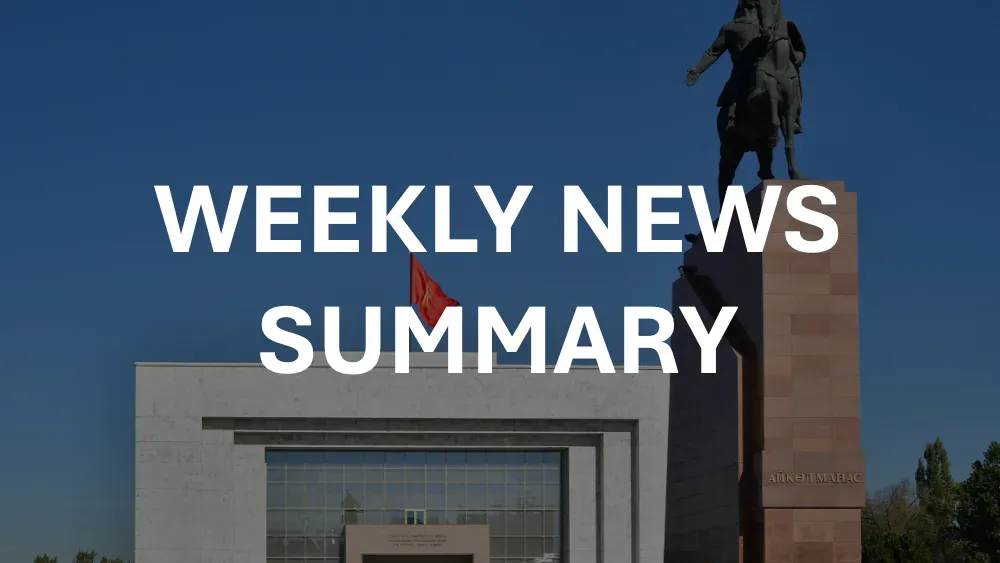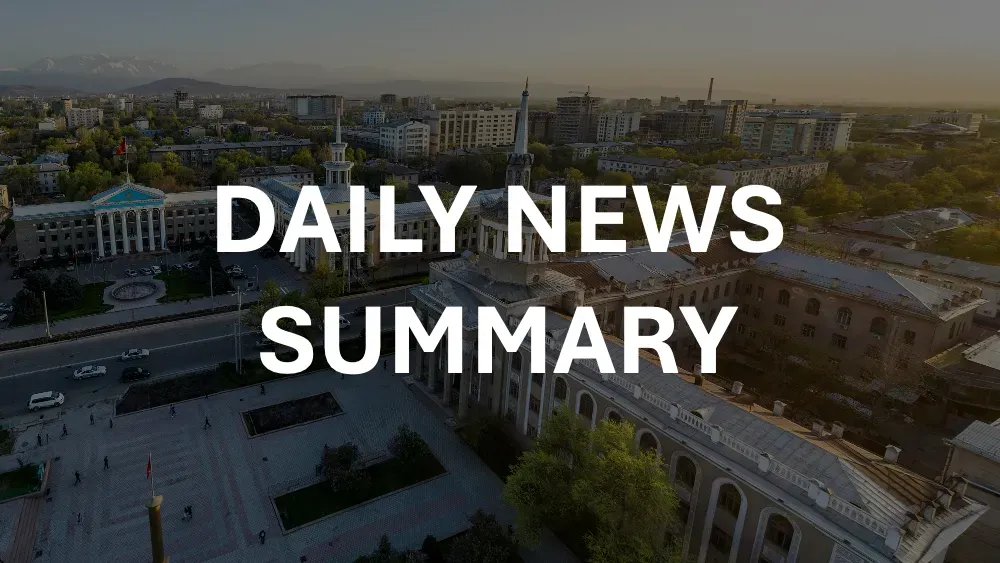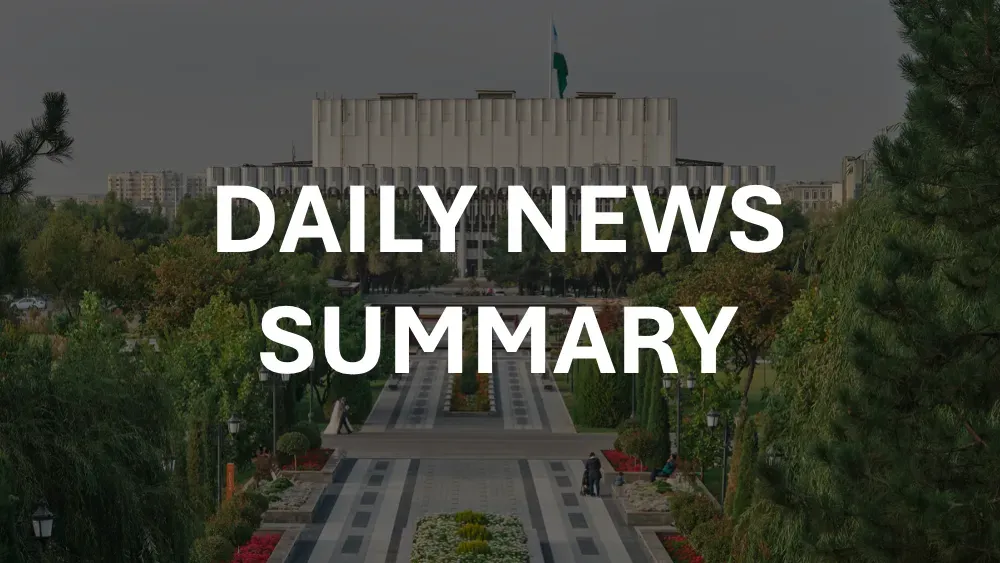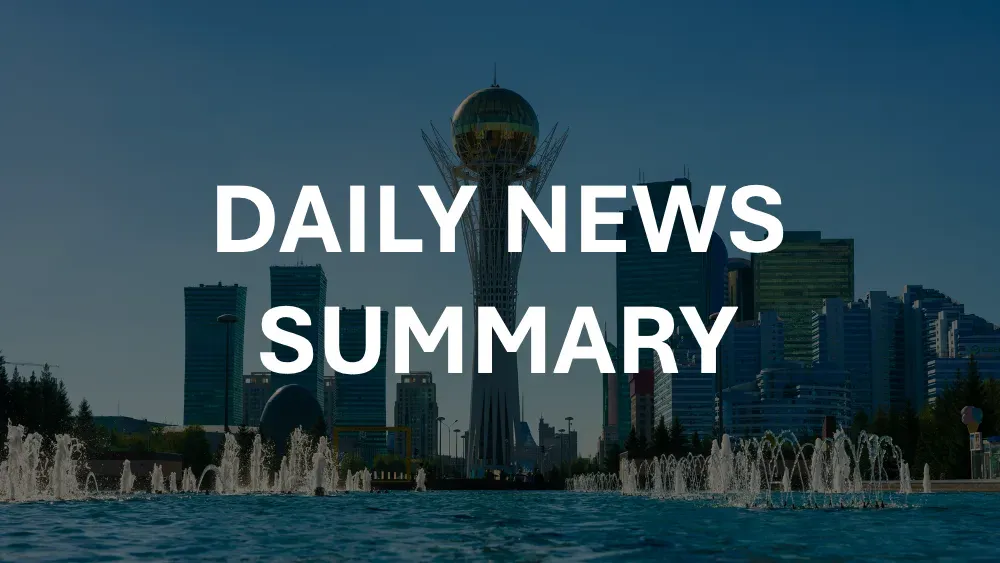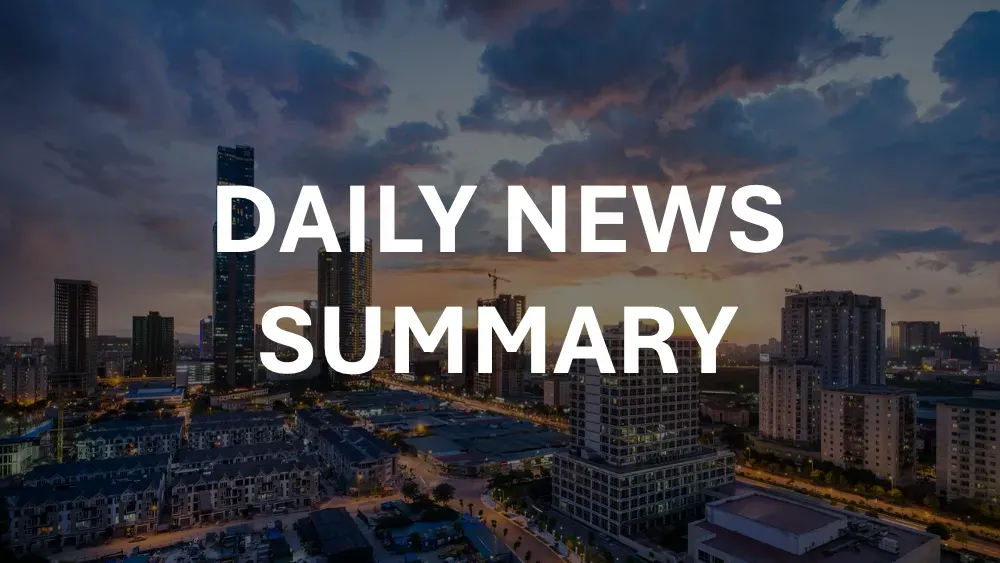This weekly digest showcases just 10 stories. Daily subscribers receive comprehensive intelligence briefs with 40 of the top stories organized by category. Don't miss the stories that matter.
Subscribe to Daily →
September 13, 2025 to September 19, 2025
This week's top 10 stories from Kyrgyzstan, selected from our daily intelligence briefs.
1. Energy Minister Warns of Toughest Winter as Low Toktogul Reservoir Levels Strain Power Supply
Kyrgyzstan faces a severe winter power shortage as Toktogul Reservoir levels are about 1.6 billion cubic meters lower than a year ago, Energy Minister Talaybek Ibraev warned, calling this “the most difficult” winter for the sector. Domestic electricity demand has reached roughly 18 billion kWh and is rising by about 1 billion kWh per year, while internal generation remains around 14–15 billion kWh, leaving a 3–4 billion kWh shortfall currently met by imports. The ministry said exact import, export and transit figures will be finalized at a trilateral session in late October.
To manage the deficit and conserve reservoir water, Kyrgyzstan, Kazakhstan and Uzbekistan held a meeting on 7 September in Cholpon-Ata and signed a protocol on power deliveries through spring 2026 that obliges Kazakhstan and Uzbekistan to supply electricity during the cold season and establishes arrangements to transit Russian and Turkmen power. Ibraev projected energy self-sufficiency by 2028 as major generation projects under construction come online, signaling a strategic shift to expand capacity and reduce vulnerability to hydrological volatility.
Local Coverage: sputnik.kg, kabar.kg
From daily briefs: 2025-09-13, 2025-09-19
2. New Investment Law and Big Projects Draw Larger FDI Inflows
Foreign direct investment into Kyrgyzstan rose to $746.9 million in the first nine months of 2024, a 14.1% year-on-year increase, led by China (29.7%), Russia (25.8%), Turkey (9.6%), Kazakhstan (6.6%) and the Netherlands (4.4%). Officials attribute the inflows to reforms that simplify procedures, increase transparency, reduce bureaucracy and provide tax incentives, and to large infrastructure projects such as the Kambar‑Ata‑1 hydroelectric plant and the China–Kyrgyzstan–Uzbekistan railway as well as a range of PPPs and SME initiatives targeting energy, manufacturing, AI and mining.
In June 2025 Kyrgyzstan enacted a new Investment Law to codify investor‑state relations, guarantees and dispute‑protection mechanisms; the law aims to underpin longer‑term targets of about 5% annual GDP growth, a 5% unemployment rate, per‑capita GDP of at least $1,500 and FDI inflows exceeding 13% of GDP. For international professionals, the combination of legal clarity, targeted incentives and flagship projects signals more predictable dealmaking conditions and growing opportunities—particularly for investors focused on infrastructure, energy and extractive sectors.
Local Coverage: kabar.kg
From daily brief: 2025-09-18
3. Beijing–Bishkek–Tashkent Railway Build Accelerates with Utility Rerouting and Land Handover Orders
Kyrgyzstan has accelerated preparation for the China–Kyrgyzstan–Uzbekistan (CKU) railway after a progress meeting chaired by Deputy Prime Minister Bakyt Torobaev, focusing on utility relocation and site readiness. Authorities reported that temporary power lines and access roads are nearly complete, industrial facilities and a construction base are being established, and priority has been given to rerouting electricity, gas, water and telecommunications lines; local governments were ordered to finalize land acquisition and right-of-way allocations and to clear road shoulders to open construction corridors.
The push is intended to keep the strategic Beijing–Bishkek–Tashkent transit link on schedule and to bolster Kyrgyzstan’s role in regional logistics between China and Central Asia. No new timelines or cost figures were published in the government summary; the announcements emphasized operational directives rather than direct statements from named officials beyond Torobaev’s chairing of the meeting.
Local Coverage: kabar.kg, 24.kg
From daily brief: 2025-09-17
4. Foreign Investment Halves as Lawmakers Push Privatization Amnesty and Banks Readied for SME Lending
Foreign direct investment inflows have halved year‑on‑year, government officials say, as parliament’s budget committee advanced a first‑reading bill to grant amnesty for assets privatized between 1991 and 2024—excluding social facilities—to protect “good‑faith” buyers amid ongoing disputes over state asset recoveries and property‑rights enforcement. First Deputy Cabinet Chair Daniyar Amaneldiev reported that 126 firms have opened this year with $450 million in investment, about half the volume of last year, and announced authorities are preparing local banks to expand affordable SME lending, including a $700 million capitalization of Elgar Bank from Eurobond proceeds.
Opposition MPs, notably Elvira Surabaldieva, link the investor retreat to pressure on domestic entrepreneurs and weakened rule‑of‑law protections, warning that intimidation and forced payments undermine confidence. Analysts urge reforms in dispute resolution, stronger property protections and development of financial hubs as necessary steps to restore investor confidence and reverse the FDI decline.
Local Coverage: azattyk.org
From daily brief: 2025-09-15
5. Energy Overhaul Plans Set 2026–2030 with 10 Projects and 31.4 Billion Som in External Financing
Kyrgyzstan’s Finance Ministry has laid out a 2026–2030 power‑sector investment program of 10 major projects funded by about 31.4 billion som in external financing to modernize the grid and expand generation. Priority works include full overhaul of Toktogul HPP (replacement of all four hydro units), modernization of the second unit at Kambar‑Ata HPP‑2, and complete unit replacement at Uch‑Kurgan HPP, alongside converter substation and high‑voltage line rehabilitations. The plan also advances renewables through construction of small hydropower plants and feasibility studies for utility‑scale solar.
Expected backers named in the fiscal policy report include the World Bank, Green Climate Fund and EBRD. For international investors and operators the roadmap signals improved grid reliability and added baseload from rehabilitated HPPs, plus a defined pipeline for solar development contingent on feasibility outcomes—presenting project and financing opportunities over the 2026–2030 timeframe.
Local Coverage: 24.kg, kyrgyztuusu.kg
From daily brief: 2025-09-13
6. Economy Expands 11% with Strong Construction and Industry; Tourism Investment Surges as Winter Season Prep Begins
Kyrgyzstan’s economy expanded strongly in January–August 2025, with preliminary real GDP rising 11% year‑on‑year to KGS 1.042 trillion. Growth was broad‑based: construction surged 34.8%, industry grew 11.6% (notably pharmaceuticals up 2.2x, food processing +44.4%, chemicals +22.8%, rubber/plastics and building materials +32.2%, textiles +7.1%, mining +15.5%), services climbed 9.5% and agriculture 2.4%. Capital investment reached KGS 166 billion (+20.1% y/y), of which the republican budget funded about 30% (2.6× higher than a year earlier). Inflation measured 5.1% (or 5.4% since Dec 2024; 9.5% y/y in one series), signalling manageable but elevated price pressures.
Tourism also posted notable gains in H1 2025: value added topped KGS 30.1 billion (+29% y/y) and fixed investment jumped 2.7× to KGS 11.3 billion, helped by Kyrgyzstan’s inclusion in the Financial Times’ top 50 global destinations and a policy pivot toward winter‑season readiness. Officials including Cabinet Chair Adylbek Kasymaliev have stressed price stability and seasonal preparation, while economists such as Tölenbek Abdyrov highlight a structural shift toward services and construction and call for sustained industrial policy and food‑security measures to maintain momentum amid inflationary risks.
Local Coverage: 24.kg, kabar.kg, kyrgyztuusu.kg
From daily briefs: 2025-09-16, 2025-09-17
7. State Guarantee Backs $5.3 Million Loan to Minister’s Brother’s Firm for Fish Farm Project
Parliamentary committee approval has cleared a government decision to provide a state guarantee for a $5.3 million loan to a company owned by the brother of Kyrgyz Transport and Communications Minister Absattar Syrgabaev, aimed at developing a fish-farming project, Azattyk reports. The announcement did not include the loan’s terms, project timeline, or specific safeguards to prevent preferential treatment.
The decision signals the government’s readiness to underwrite aquaculture investments but raises conflict-of-interest and transparency concerns given the beneficiary’s family ties to a senior official. Expect increased scrutiny from lawmakers, investors and civil-society groups over procurement processes and oversight mechanisms; absent clear disclosure of safeguards, the move may undermine confidence in fair access to state-backed financing.
Local Coverage: azattyk.org
From daily brief: 2025-09-14
8. Russian Duma Ratifies Protocol Extending Temporary Customs Declarations for Oil Shipments to Kyrgyzstan
Russia’s State Duma ratified a protocol (signed in St. Petersburg on December 20, 2023) amending the intergovernmental agreement on oil and petroleum supplies to Kyrgyzstan to extend the use of temporary periodic customs declarations for pipeline deliveries. The measure, provisionally applied since December 31, 2024, ensures that from January 1, 2025 exports via pipeline will be declared using temporary declarations aligned with indicative balance volumes, preserving existing customs-management procedures.
The step is procedural rather than commercial—no changes to pricing or firm volume commitments were disclosed—and is intended to streamline administrative handling of cross‑border energy flows and provide predictable compliance for market participants. For international professionals, the ratification signals continuity in Russia–Kyrgyzstan energy coordination and reduced regulatory uncertainty ahead of the 2025 delivery year.
Local Coverage: 24.kg
From daily brief: 2025-09-18
9. Government Commission Endorses 2022–2024 National Risk Assessment on Terror Finance and Money Laundering
A high‑level government commission chaired by First Deputy Chairman of the Cabinet of Ministers Daniyar Amangeldiev approved the 2022–2024 National Risk Assessment (NRA) on terrorist financing and money‑laundering in Bishkek, identifying key threats and vulnerabilities across Kyrgyzstan’s AML/CFT framework. The assessment singles out risks linked to virtual assets and electronic payment systems, and the commission directed government agencies to strengthen interagency coordination and enhance detection and blocking of suspicious financial operations; a signed protocol sets implementation timelines and formalizes tighter compliance expectations for financial institutions and emerging fintech services.
The decision signals Kyrgyz authorities’ intent to align more closely with international AML/CFT standards and raises the likelihood of stricter supervision and enforcement for providers of virtual-asset services and electronic payments during 2022–2024. For international professionals, the NRA implies increased due‑diligence requirements, greater information‑sharing demands from Kyrgyz counterparties, and potential regulatory changes affecting cross‑border payment flows and fintech integrations.
Local Coverage: kabar.kg
From daily brief: 2025-09-13
10. Central Bank Steps In Four Times This Year to Steady Som, Latest Selling $81.5M
Kyrgyzstan’s National Bank intervened in the foreign-exchange market for the fourth time this year on September 15, selling $81.5 million ($53.0m settled on trade date, $28.5m settled later). Deputy Chairman Azat Kozubekov said total interventions in 2025 are estimated at $300–400 million (official year-to-date sales disclosed at $378.6m), and the September operation nudged the average dollar selling rate down by 0.02 som to around 87.6 KGS in exchange offices while the National Bank’s reference rate was 87.45 KGS.
The interventions are being used to smooth sharp movements under Kyrgyzstan’s flexible exchange-rate regime amid shifting regional capital flows and seasonal import demand. The size and timing of the sales signal the central bank’s readiness to supply dollars to protect som liquidity and anchor short-term expectations—relevant for importers, remitters and corporates managing dollar exposures—while narrow bank spreads and stable intraday quotes suggest limited immediate market stress.
Local Coverage: sputnik.kg, 24.kg, kabar.kg
From daily briefs: 2025-09-13, 2025-09-16, 2025-09-17, 2025-09-19
About This Weekly Digest
The stories above represent the most significant developments from Kyrgyzstan this week, selected through our AI-powered analysis of hundreds of local news articles.
Stories are drawn from our daily intelligence briefs, which synthesize reporting from Kyrgyzstan's leading news sources to provide comprehensive situational awareness for international decision-makers.
These weekly highlights are a small sample of what's happening. Daily subscribers get comprehensive briefings with 40 top stories that connect the dots between events, track developing stories, and provide the context you need for informed decision-making.
Upgrade to Daily →


